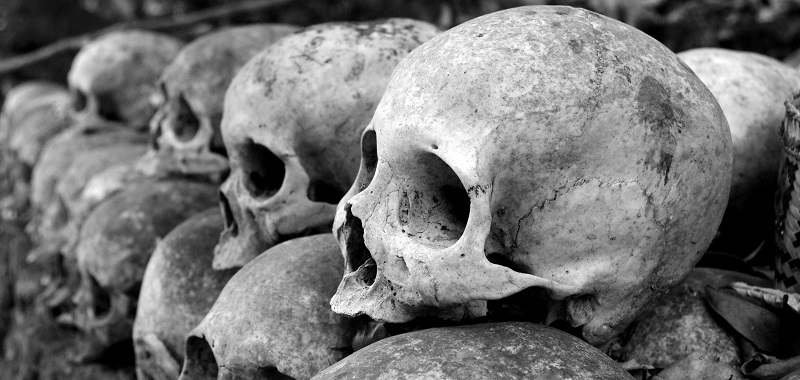Concert Haunts: Opera Arias for your Halloween-Themed Concert
Horror, mystery, darkness, death, ghosts, witches, blood, sorcery… Opera is saturated with the same characteristics and subject matter that define Halloween, making the holiday the perfect opportunity to program a concert. Whether you’re looking to create a supplemental singing opportunity between gigs or just love Halloween and are interested in another way to celebrate, here is a list of arias to get you started that are sure to thoroughly creep out your audience. Just add costumes and some eerie lighting, and you’re all set to feature some of opera’s most thrilling and horror-worthy moments.
“Furie terribili” from Handel’s Rinaldo
Role: Armida
Voice type: soprano
Armida’s fiery entrance aria spectacularly showcases the sorceress’s power and mystique, making a fantastic program opener. Short in length and big on drama, this aria would complement any spooky concert program. In this scene, Armida establishes herself as a powerful figure fully capable of bending the universe to her malicious will and changing the fates of those around her.
“Il dolce suono” (Mad Scene) from Lucia di Lammermoor by Donizetti
Role: Lucia
Voice type: soprano
No Halloween-themed concert would be complete without your classic, murder-induced mad scene. At this point in Donizetti’s opera, Lucia has just killed her bridegroom, Arturo, during their wedding festivities. Lost in her madness, she thinks that she can now happily be with her true love, Edgardo, and imagines being with him at their own wedding while still covered in the blood of Arturo. This famous scene is known for being both technically demanding as well as incredibly eerie.
“Re dell'abisso, affrettati” from Verdi’s Un Ballo in Maschera
Role: Ulrica
Voice type: contralto
Calling upon the “King of the Abyss,” this fortune teller’s incantation causes some serious trepidation and will undoubtedly send shivers down your spine. Ulrica has already been suspected of witchcraft at the start of the opera, and this summoning of dark powers to do this demon’s bidding only confirms that suspicion.
“Son lo Spirito” from Boito’s Mefistofele
Role: Mefistofele
Voice type: bass
What’s scarier than the sudden, unexpected appearance of the Devil himself? At this point in the opera, an aging Faust is unexpectedly visited by the Devil in disguise (Mefistofele). Mefistofele proceeds to reveal his evil nature and eventually offers Faust a pact. In exchange for Faust’s soul, Mefistofele will restore the old man’s youth. Though this devious role is equally as sinister in Gounod’s Faust, I find this aria in particular to be equal parts chilling and entertaining. Bonus points for pulling off the whistling.
Ophelia’s Mad Scene from Hamlet by Thomas
Role: Ophelia
Voice type: soprano
Thomas’s gorgeous, virtuosic rendition of the famous Shakespearean mad scene is nothing short of disturbing. A spurned lover’s descent into insanity never sounded so good! Ophelia has just been rejected by Hamlet for reasons out of her control and consequently falls into complete madness. At first, she believes that she has married Hamlet. Eventually, however, Ophelia sings about a siren who lures men to their death beneath the water. She continues to descend into instability until she has drowned herself in a lake at the end of the scene.
“Hurr, hopp, hopp, hopp!” (Hexenlied) from Hänsel und Gretel by Humperdinck
Role: Die Hexe
Voice type: mezzo-soprano
How can we plan a Halloween celebration without inviting some witches? While brief, this “Witch’s Dance” provides a fantastic opportunity to dig into the classic, cannibalistic witch persona that has terrified us since childhood. Hänsel and Gretel have just been discovered near the Witch’s house, causing the Witch to excitedly jump around and cast a spell upon the children.
“Čury mury fuk” from Rusalka by Dvořák
Role: Jezibaba
Voice type: mezzo-soprano
Spells cast, evil witches, mermaids, and magic... Rusalka is filled with Halloween parallels. Just as the soprano in the opera is always doomed to go mad, the mezzo is always destined to play the witch/evil sorceress. In this spellbinding aria, Jezibaba creates a potion that will not only turn Rusalka into a human so that she can be with her prince but also, in a sinister turn of events, take away both Rusalka's ability to speak as well as her immortality.
"Afraid, am I afraid?" from The Medium by Menotti
Role: Madame Flora (Baba)
Voice type: mezzo-soprano
Finally, mezzos get their own taste of madness, or drunkenness, with Baba’s aria from The Medium. At this point in the opera, as she becomes increasingly intoxicated, Baba is having more and more trouble deciphering between what she foretold as a faux-medium and what is real contact with the supernatural. Having gone through years of fabricating messages from the dead, could Baba actually be connecting with the beyond, or is she a victim of her own duplicity?
“I burn! I freeze!” from Stravinsky’s The Rake’s Progress
Role: Nick Shadow
Voice type: bass-baritone
Damning Tom Rakewell as he descends into hell, Nick Shadow’s defeat and demise is full of terror. The vanquishing of a demonic figure demands no less than an extremely dramatic exit. In this scene, Nick plays one last trick against Tom, a game of cards, and ultimately loses. The devilish servant consequently condemns Tom to insanity as he falls into the earth.
“Miles!” from Britten’s The Turn of the Screw
Role: Peter Quint
Voice type: tenor
It’s difficult to choose only one segment to highlight from what is arguably the creepiest ghost-ridden opera ever written. However, there’s just something about Peter Quint’s aria that exemplifies the lingering ghost of our nightmares so well. Quint’s ghost is a former manservant who was suspected of preying on the child, Miles, while he was alive. In this aria, Peter Quint’s ghost calls to Miles in a series of disturbing melismas while the child sleeps. The ghost ultimately wakes Miles up and convinces the child to steal a letter betraying the truth about his haunting presence in the house to Miles’ guardian.
“They Are Always With Me” from The Ghosts of Versailles by Corigliano
Role: Marie Antoinette
Voice type: soprano
Sometimes history is so horrifying that it requires no embellishment; hence, the ghost of Marie Antoinette recounting, in aria form, the events of the French Revolution leading to her execution. This aria occurs early on in the opera as ghosts from the court of Louis XVI assemble in the theater at Versailles. Beaumarchais (yes, THAT Beaumarchais) announces his love for the executed Queen, who is still too horrified by the memories of her departed life to reciprocate. Marie Antoinette is a ghost that not only haunts, but is herself haunted, begging “let me forget."
This list of spooky musical choices should get you well on your way to creating a truly haunting concert for Halloween. Throughout history, Opera has covered a vast array of dark and horror-worthy subject matter, and these arias contain no shortage of demons, death, witchcraft, and the supernatural. Which arias would you add to the list?








